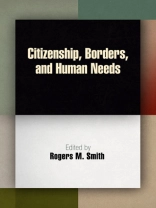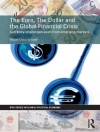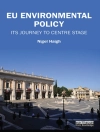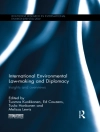From anxiety about Muslim immigrants in Western Europe to concerns about undocumented workers and cross-border security threats in the United States, disputes over immigration have proliferated and intensified in recent years. These debates are among the most contentious facing constitutional democracies, and they show little sign of fading away.
Edited and with an introduction by political scientist Rogers M. Smith, Citizenship, Borders, and Human Needs brings together essays by leading international scholars from a wide range of disciplines to explore the economic, cultural, political, and normative aspects of comparative immigration policies. In the first section, contributors go beyond familiar explanations of immigration’s economic effects to explore whose needs are truly helped and harmed by current migration patterns. The concerns of receiving countries include but are not limited to their economic interests, and several essays weigh different models of managing cultural identity and conflict in democracies with large immigrant populations.
Other essays consider the implications of immigration for politics and citizenship. In many nations, large-scale immigration challenges existing political institutions, which must struggle to foster political inclusion and accommodate changing ways of belonging to the polity. The volume concludes with contrasting reflections on the normative standards that should guide immigration policies in modern constitutional democracies.
Citizenship, Borders, and Human Needs develops connections between thoughtful scholarship and public policy, thereby advancing public debate on these complex and divisive issues. Though most attention in the collection is devoted to the dilemmas facing immigrant-receiving countries in the West, the volume also explores policies and outcomes in immigrant-sending countries, as well as the situation of developing nations—such as India—that are net receivers of migrants.
Daftar Isi
Introduction
—Rogers M. Smith
1. International Migration: Global Trends and Issues
—Demetrios G. Papademetriou
PART I. CITIZENSHIP, BORDERS, AND ECONOMIC NEEDS
2. Rural Migration and Economic Development with Reference to Mexico and the United States
—Antonio Yu’nez-Naude
3. Global Migrations and Economic Need
—Saskia Sassen
4. The Immigration Paradox: Alien Workers and Distributive Justice
—Howard F. Chang
5. What Is an Economic Migrant? Europe’s New Borders and the Politics of Classification
—Karolina Szmagalska-Follis
PART II. CITIZENSHIP, BORDERS, AND CULTURAL NEEDS
6. Brokering Inclusion: Education, Language, and the Immigrant Middle Class
—Mae M. Ngai
7. Immigration, Citizenship, and the Need for Integration
—Christian Joppke
8. Engendering Culture: Citizenship, Identity, and Belonging
—Leti Volpp
9. Three Models of Civic Solidarity
Sarah Song
PART III. CITIZENSHIP, BORDERS, AND POLITICAL NEEDS
10 Immigration and Security in the United States
—Christopher Rudolph
11. Citizenship’s New Subject: The Illegal Immigrant Voter
—Kamal Sadiq
12. ”We the People” in an Age of Migration: Multiculturalism and Immigrants’ Political Integration in Comparative Perspective
—Irene Bloemraad
13. Associational Governance of Ethno-Religious Diversity in Europe: The Dutch Case
—Veit Bader
PART IV. TOWARD NORMATIVE PRINCIPLES
14. When and Why Should Liberal Democracies Restrict Immigration?
—Stephen Macedo
15. Expatriatism: The Theory and Practice of Open Borders
—Chandran Kukathas
16. Citizenship and Free Movement
—Rainer Bauböck
Contents
Notes
List of Contributors
Index
Tentang Penulis
Rogers M. Smith is Christopher H. Browne Distinguished Professor of Political Science at the University of Pennsylvania and coeditor of Varieties of Sovereignty and Citizenship, also available from the University of Pennsylvania Press.












